Protecting Zebras: Innovative Zebra Conservation Efforts.
Zebra conservation efforts
Zebras are iconic African animals that have captured the attention and imagination of people around the world. Unfortunately, zebras are also facing numerous threats that have led to a significant decline in their populations. Habitat loss, poaching, and climate change are just a few of the factors that are contributing to the decline of zebras in the wild. To combat these threats, various conservation efforts are being undertaken to ensure the survival of these magnificent animals.
Importance of Zebra Conservation:
Zebras play a vital role in the ecosystem as they are an important prey species for predators like lions, hyenas, and wild dogs. They also help maintain the balance of grassland ecosystems by grazing and trampling vegetation, which helps to prevent overgrowth and promote biodiversity. Additionally, zebras are a source of income for local communities through ecotourism, and their conservation is essential for the preservation of cultural and natural heritage.
Challenges Faced in Zebra Conservation:
The conservation of zebras faces many challenges, including habitat fragmentation, loss of migration routes, and human-wildlife conflict. Climate change is also causing significant changes in zebra populations, including changes in migration patterns, and droughts that impact their food and water sources. Poaching for their meat, hides, and bones also continues to be a major threat to the survival of zebras.
Innovative Conservation Initiatives:
Various innovative conservation initiatives are being undertaken to protect zebras from extinction. One such initiative is the use of technology like GPS collars and satellite tracking to monitor and track zebra populations, which helps to identify areas of high poaching risk and allows for targeted anti-poaching efforts. Other initiatives include the restoration of zebra habitats through reforestation, and the development of alternative livelihoods for local communities to reduce their dependence on zebra products.
Anti-Poaching Strategies:
Anti-poaching efforts are a critical component of zebra conservation efforts. Strategies include community-based anti-poaching patrols, the establishment of protected areas, and the use of sniffer dogs to detect illegal wildlife products. Law enforcement efforts are also being stepped up, with governments enacting stricter penalties for poaching and illegal wildlife trade.
Captive Breeding Programs:
Captive breeding programs have been established to ensure the survival of certain zebra species, such as the Grevy's zebra. These programs involve the breeding of zebras in captivity, with the eventual release of individuals into the wild to boost wild populations.
Sustainable Development Practices:
Sustainable development practices that promote the coexistence of humans and wildlife are also being implemented to protect zebras. These practices include ecotourism initiatives that generate income for local communities, while also promoting the conservation of zebras and their habitats.
Successful Conservation Programs:
Successful conservation programs have been established in several African countries, including Kenya, Namibia, and South Africa. In Kenya, for example, the Grevy's Zebra Trust has successfully implemented community-based conservation efforts that have led to an increase in Grevy's zebra populations.
Role of Local Communities:
The role of local communities in zebra conservation efforts is critical. It is essential to involve local communities in conservation efforts, as they are often the first line of defense against poachers and are also the most affected by the impact of zebra conservation efforts. Education and awareness-raising programs are also important to ensure that local communities understand the importance of zebras and their conservation.
Zebra ecotourism and sustainable development
Ecotourism has been recognized as a powerful tool for promoting sustainable development while also conserving biodiversity. Zebras are among the charismatic African wildlife species that attract a large number of tourists to Africa. Ecotourism focused on zebras can offer significant benefits to local communities while also contributing to the conservation of the species and their habitats.
Importance of Zebra Ecotourism:
Zebra ecotourism can generate income for local communities and provide employment opportunities. This can lead to a reduction in the pressure on natural resources, as alternative sources of income are developed. Additionally, ecotourism can promote conservation awareness and foster a sense of pride in local communities regarding their natural heritage.
Challenges Faced in Zebra Ecotourism:
Zebra ecotourism faces various challenges, including competition with other tourist destinations, poor infrastructure, and inadequate marketing. Wildlife trafficking and poaching for zebra products also pose a threat to the success of ecotourism initiatives. Additionally, ecotourism can have negative impacts on the environment and local communities, including increased waste generation and unsustainable resource use.
Sustainable Development Practices:
To ensure the success of zebra ecotourism, sustainable development practices must be implemented. This includes responsible tourism practices, such as minimizing waste, conserving water, and reducing energy consumption. The involvement of local communities in ecotourism initiatives is also crucial, as it can lead to greater ownership and support for conservation efforts. Capacity building and training programs can also be implemented to ensure that local communities benefit from ecotourism and are equipped with the skills necessary to manage and sustain ecotourism initiatives.
Benefits of Zebra Ecotourism:
Zebra ecotourism has numerous benefits, including the promotion of sustainable development, the creation of employment opportunities, and the support of conservation efforts. Ecotourism also provides a unique opportunity for tourists to experience and learn about zebra behavior, habitat, and conservation challenges. This can lead to a greater appreciation of the value of biodiversity and the need for its conservation.
Successful Zebra Ecotourism Programs:
Successful zebra ecotourism programs have been established in various African countries, including Kenya, Tanzania, and South Africa. In Kenya, for example, the Maasai Mara National Reserve is a popular zebra ecotourism destination, attracting thousands of tourists each year. The Maasai Mara Wildlife Conservancies Association has established a community-based conservation initiative that promotes zebra ecotourism while also supporting local livelihoods and wildlife conservation.
Conclusion:
In conclusion, zebra ecotourism can offer significant benefits to local communities while also promoting the conservation of zebra populations and their habitats. However, the success of zebra ecotourism initiatives depends on the implementation of sustainable development practices, community involvement, and the promotion of responsible tourism. By working together, local communities, conservation organizations, and tourists can ensure that zebra ecotourism contributes to sustainable development while also promoting the conservation of these iconic African animals.
Here Is some FAQ
1. What is a zebra?
A zebra is a member of the equine family, which is native to Africa. They are known for their distinctive black and white striped coat.
2. What do zebras eat?
Zebras are herbivores and their diet consists mostly of grasses, leaves, and bark. They are adapted to grazing on tough grasses and can survive on limited water sources.
3.How fast can zebras run?
Zebras are fast runners and can reach speeds of up to 65 km/h (40 mph). They use their speed to escape predators like lions, hyenas, and wild dogs.
4. Are zebras endangered?
Zebras are not considered to be endangered, but some subspecies are vulnerable due to habitat loss and hunting for their skins and meat. The Grevy's zebra, for example, is listed as endangered by the IUCN.
5. Are zebras domesticated?
Zebras are not typically domesticated and are difficult to train due to their wild nature. However, some people have been able to train zebras for riding and other purposes. In general, zebras are best left in the wild where they can roam freely.
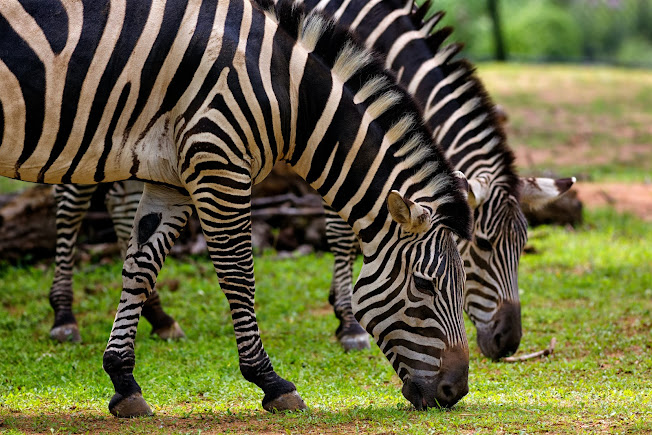
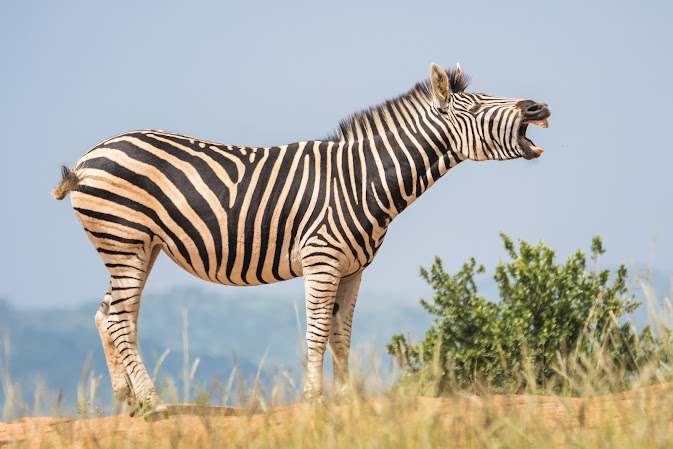
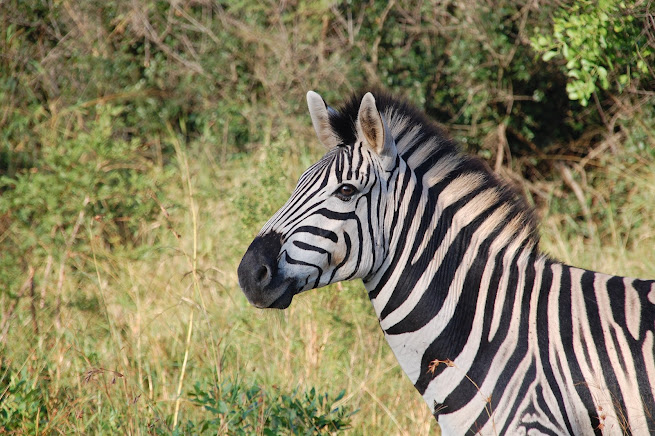
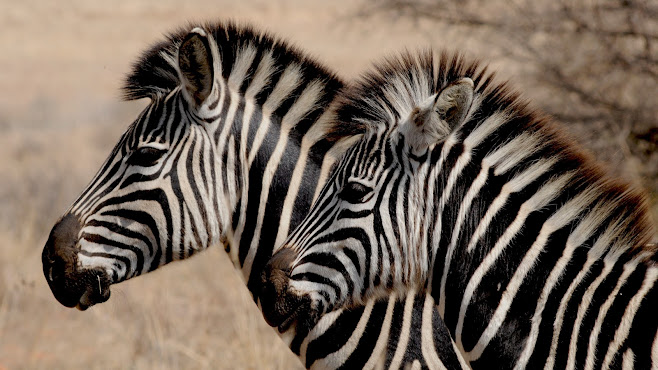
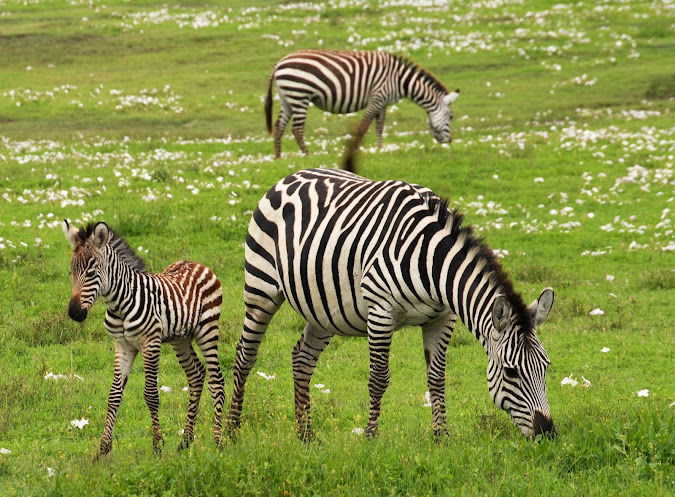



Comments
Post a Comment